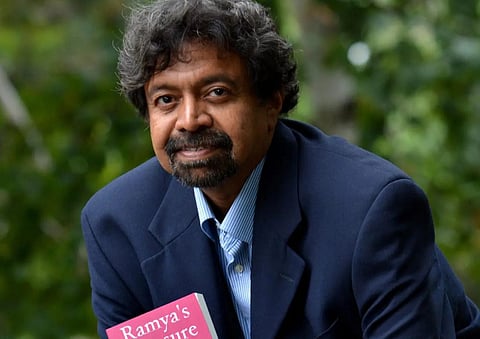

HYDERABAD: CE captures novelist and short story writer Pratap Reddy in conversation with media academic Usha Raman, shedding light on the themes of immigration, loss and nostalgia in his books as well as sharing insights on what made him a writer
A cloudy Saturday evening witnessed a jolly get-together of some of the alumni of Nizam College at the institute’s Salar Jung Hall– the occasion being author Pratap Reddy throwing light on the themes of loss, nostalgia, hope and dreams as presented in his books and discussing them with media academic, Usha Raman.
Pratap Reddy emigrated to Canada in 2002 and currently works for a major insurance company. He writes short stories, novels, and poems with a focus on the immigrant experience. His first book Weather Permitting & Other Stories (2014) was followed by a novel Ramya’s Treasure (2016). His second collection Remaindered People & Other Stories will be published in 2024. An alumnus of the Humber School for Writers, he is a recipient of grants from the Ontario Arts Council and a winner of the Best Writer award from the Mississauga Arts Council.
A self-made writer, who believes that anyone could learn to write fiction, Reddy has a sense of connecting deep emotions, induced by lived experiences of an immigrant in the West with the practicality of a writer writing for an audience.
“Migration or Immigration is an ongoing story and it is different in terms of which decade you emigrated in; your stories seem to speak of a very different slice of that migration and about how it was different in Canada than in the United States. How do you find your mental writing space?” asked Usha Raman, to which the novelist replied, “I don’t know much about the ‘writer’s writing’. I react to my environment which is different from a traditional writer who needs to be imaginative and needs to leave the warmth of his neighbourhood to be in his mental or visual space. I wanted to write to record my experiences and that was my intention throughout. My early writings got great support from my fellow colleagues in writing groups and creative writing courses; also won awards and grants. It all was a surprise to me initially.”
Usha Raman pointed out that he has a distinct way of writing ‘open-ended stories’, which do not necessarily have a resolution in the end and often leave some questions unanswered. He said that it was not a conscious strategy. “In fact, some of my colleagues have told me that my stories are good but the endings are terrible! Surprisingly, the Canadians who read my stories thought of them as a scope for further development. There was a man from Guatemala who praised them a lot and somehow it resonated with his South American reading experience,” he said.
Pointing out that his novel, Ramya’s Treasure includes insights from both an emigrant’s experience and growing up in India, specifically in Hyderabad, Usha Raman asked Reddy about his transitions from being a short story writer to a novelist and then also a poet. “My editor believes that unless you write short stories, you cannot move to a novel. I followed that and also continued to write short stories,” he responded.
“As I was writing, someone told me that my short story has all the important ingredients of a novel. On one hand, as a story, it had a beginning, middle and end, and then could also fit into the larger narrative arc of a novel,” he added.
On being asked by a member of the audience, why he chose the name ‘Ramya’ for his novel, he said tactically, “I was looking for something short and smooth.” The session concluded with the author handing over signed copies of his books to two lucky attendees.
The talk was organised by Hyderabad Literary Festival, in collaboration with Srinivas Rayaprol Literary Trust. “His books are easy to read and characters reminiscent of the everyday experience. Hyderabad and Toronto are his two cities and two homes for the diaspora in his writings,” said sociologist Aparna Rayaprol.